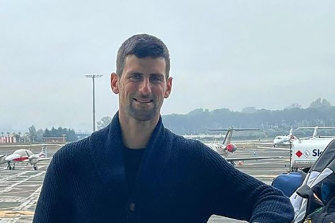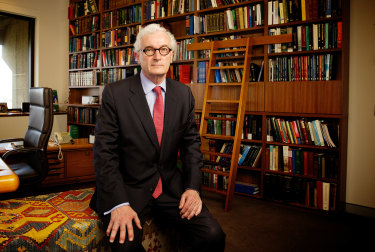Djokovic goes from greatest to anti-vax icon
Liberty Victoria president Mike Stanton tweeted during the hearing: “Deportation of a person because of a purported risk as to how others might perceive them and then act sets a terrible precedent.”
Djokovic joins an inglorious roll call of Holocaust deniers, convicted criminals and political extremists who have all crashed against Australia’s cold, hard border.
The Federal Parliament changed Australia’s migration laws eight years ago to make it easier for the Immigration Minister to deport people. To lawfully cancel Djokovic’s visa, Alex Hawke needed only be satisfied that his presence might agitate the anti-vax mob, not be convinced that it would.

Happier times: Novak Djokovic published this Instagram post of himself preparing to travel to Australia on 4 January.Credit:Novak Djokovic/Instagram
As strong as Djokovic’s defences are on a baseline, his legal team was at long odds to prevent the government from easing over such a low bar. Djokovic’s next challenge will be to plead for special consideration to be allowed back into Australia and his favourite major tournament within the next three years.
That assumes he ever wants to return.
Djokovic’s counsel, Nicholas Wood, SC, argued that the evidence supporting the notion that his client’s presence would undermine the pandemic response was comically thin, based largely on a BBC report of what Djokovic said about vaccines nearly two years ago, some of his bizarre ideas about mind power and a conspiratorial Instagram post by his wife.
For 11 months of the year, Djokovic travels the world to play tennis and nearly always wins wherever he goes. Where was the evidence that his presence in any other country had fuelled anti-vax rallies?
Mr Lloyd responded that Djokovic’s actions, rather than his words, spoke loudly enough. “Djokovic had made a choice not to be vaccinated. That choice made clear his view about COVID vaccination.”
Djokovic’s best chance of winning this case was Mr Wood’s argument that the Minister needed to properly consider not only the implications of Djokovic’s presence in Australia on anti-vax sentiment, but what would happen if the government used its coercive powers to detain and deport the Serbian star.
Loading
This criticism – a failure to consider the unintended consequences of blinkered decisions – has been a common refrain about Australia’s response to the pandemic. Chief Justice James Allsop said this was the question he chewed over during lunch.
“One could see a situation where it was plain to anyone with common sense that cancelling the visa would cause overwhelming public discord and risks of transmission through very large public gatherings,” the Chief Justice mused.
But Mr Lloyd said the question wasn’t something that the court, or the government, needed to concern itself with. “The Commonwealth ought not, in the public interest, be obliged to suffer the presence of an alien merely for fear that their non-presence would incite some adverse reaction.”

Federal Court Chief Justice James Allsop.Credit:Wolter Peeters
What happens next we will likely know by Tuesday. As the panel of judges deliberated on Djokovic’s fate, anti-vax activists used their usual social media channels to promote another planned “freedom” rally that day.
By then, though, Djokovic will be back in Serbia or his adopted home in Spain, his Australian summer at an end, his reputation trashed and his legacy diminished.
The Morning Edition newsletter is our guide to the day’s most important and interesting stories, analysis and insights. Sign up here.
*** This article has been archived for your research. The original version from The Age can be found here ***


